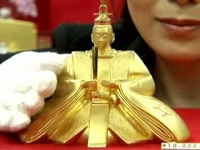December BoJ Meeting And Gold
 Last week, the Bank of Japan (BoJ) kept the pace of its money market operations unchanged, but it reorganized the stimulus program. What does it imply for the US dollar and the gold?
Last week, the Bank of Japan (BoJ) kept the pace of its money market operations unchanged, but it reorganized the stimulus program. What does it imply for the US dollar and the gold?
December was full of important events in the world of central banking. The ECB failed to meet investors’ expectations, the Fed hiked its interest rates, and the BoJ changed the guidelines for its asset-buying program. As expected, the Japanese central bank will continue expanding the monetary base at an annual pace of 80 trillion yen ($656 billion).
However, the details in the BoJ’s statement surprised investors. First, the central bank of Japan decided to extend the maturity of the Japanese government bonds it buys from 10 to 12 years from the next year. It may signal that there is lack of securities that the central bank can purchase. Second, the BoJ established a new program for purchases of exchange-traded funds composed of stocks issued by firms that are proactively making investment in physical and human capital, at an annual pace of about 300 billion yen. It reflects that lack of full independence of the BoJ (the government has been pressuring managers to invest more and raise wages) and even more political interference in business decision making and the BoJ’s impact on the asset market (the Bank of Japan owns already around half of Japan’s ETFs market). The Japanese central bank expanded also eligible collaterals for the BoJ’s provision on credit and increased the maximum amount of each issue of Japan real estate investment trust.
The undertaken measures seem to be dovish, however markets interpreted them as soft and insufficient. Therefore, as earlier the ECB, now the central bank of Japan failed to satisfy the investors’ expectations and markets believed that the Japanese central bank lacks the ammunition. This is why the yen rose against the U.S. dollar after the BoJ’s meeting.
The Bank of Japan’s meetings was positive for the gold market, but only initially, since less expansionary monetary policy gives the Fed more room to tighten further its monetary conditions. It is probably the mere coincidence that both the European Central Bank and the Bank of Japan were less dovish than expected precisely around the time when the Fed hiked its interest rates.
To sum up, the Bank of Japan was less dovish than expected in December (similarly to the ECB). On the one hand, it gives the Fed more room to tighten further its monetary conditions, which would be negative for the gold market. On the other hand, less dovish stance of the BoJ and the ECB means narrower divergence in the monetary policies among the major central bank in the world and thus softer upward pressure on the U.S. dollar. The weaker the greenback, the stronger the gold.
If you enjoyed the above analysis, we invite you to check out our other services dedicated to the precious metals investors. We invite you to join our gold newsletter today – you’ll also gain 7-day trial of our premium Gold& Silver Trading Alerts. It’s free and if you don’t like it, you can easily unsubscribe.
Arkadiusz Sieron
Sunshine Profits‘ Gold News Monitor and Market Overview Editor















